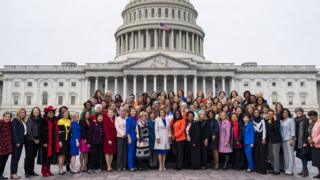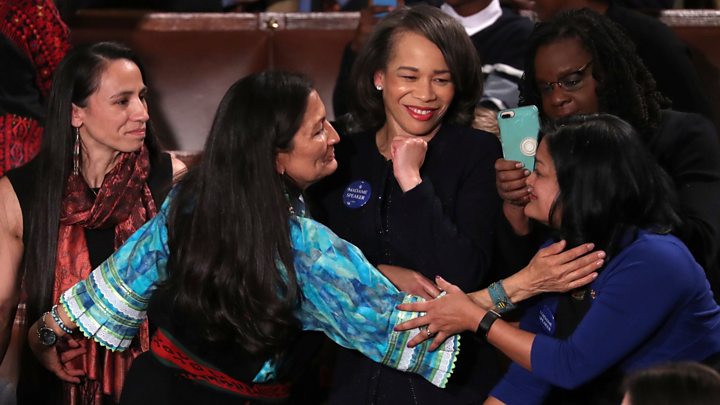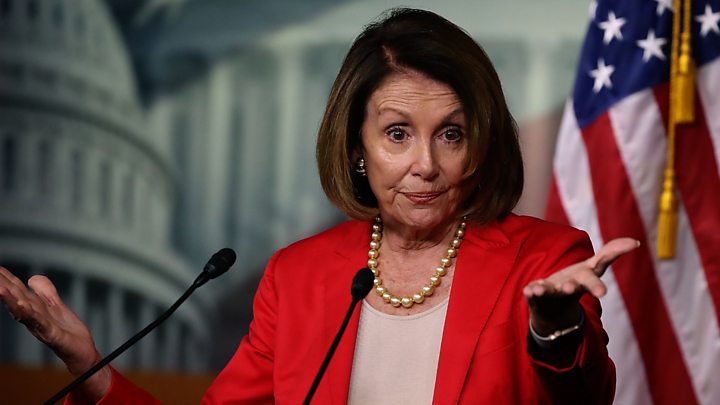 Image copyright
EPA
Image copyright
EPA
The White House says the president "isn't going to back off" as he meets congressional leaders for talks on the partial government shutdown.
President Donald Trump is refusing to sign any budget without funding for a US-Mexico border wall, which Democrats are adamantly against.
The House of Representatives passed a bill to reopen the government, but the Senate has rejected it.
Around 800,000 federal workers have been without pay since 22 December.
House Speaker Nancy Pelosi and other congressional leaders from both sides of the aisle are negotiating with Mr Trump on Friday morning.
The White House and top Democrats have shown little sign of backing down since holding their first meeting earlier this week over the partial government shutdown.
Democrats, who now hold the majority in the House, passed spending bills on Thursday to reopen the government, including $1.3bn (£1bn) of border security funds until 8 February.

But the legislation cannot take effect unless it passes the Republican-controlled Senate, where leader Mitch McConnell said his party would not back any measures without the president's support.
The Kentucky senator called the Democratic budget "a time-wasting act of political posturing".
The Washington Post reported on Friday that while hundreds of federal workers go without pay, the president's cabinet secretaries, top administrators as well as Vice-President Mike Pence are expected to receive annual raises of about $10,000.
The pay hikes will take effect on 5 January partly because of the shutdown. An existing federal pay freeze expired last month when Congress failed to reach a deal to fund federal agencies.
The partial US government shutdown began when Congress and Mr Trump failed to reach an agreement over a budget bill in December.
The Republicans had passed an initial funding bill including $5bn (£4bn) for the wall, when they still had a majority in the House, but they could not get the necessary 60 votes in the 100-seat Senate.

Which side will blink first?
Some vulnerable Republican senators up for re-election in 2020 have spoken out in favour of approving the budget bills to end the government shutdown.
Senator Cory Gardner of Colorado was the first to do so, saying on Thursday that Congress should reopen the government and let wall negotiations continue afterwards.
Maine Senator Susan Collins echoed this view, suggesting the president should sign the agreed upon spending bills first so federal employees could get back to work.
The White House is again floating the idea of a deal for 'Dreamers' - immigrants who illegally entered the US as children.
Democrats want to ensure that these individuals are shielded from deportation, but have insisted that they will not support a deal over wall funding.
Vice-President Mike Pence told Fox News the deal was being "talked about", but that Mr Trump said no deal was possible "without a wall".
Political pain grows
Anthony Zurcher, BBC News, Washington
As the partial government shutdown enters its third week, both sides are digging in.
Nancy Pelosi said building a border wall is "immoral". Donald Trump says he won't support any legislation reopening the government that doesn't fund his wall.
It's a fight about more than a few billion dollars in a trillion-dollar federal budget. It's about political priorities and who gets to set them.
That's prompted some to predict a shutdown stretching on for months.
That seems unlikely however, as the political pain is growing. Not only are government workers missing pay, but there's also the prospect that Americans filing their income taxes won't see their refund cheques processed. That will prompt howls of anger far beyond the government employee rolls.
At some point a compromise will have to be reached. The key will be finding it without the appearance that either side blinked. Such a framework could include funding for border security and "fencing" but no concrete wall, perhaps while offering Democrats the prospect of normalised status for those who illegally entered the US as children.
Both sides claim victory. Both sides are (sort of) correct. For now, however, both sides seem more interested in prolonging the fight.
What does the partial shutdown mean?
- About 25% of the US federal government has no funding
- Nine departments have been affected, including Homeland Security, Justice, Housing, Agriculture, Commerce, Interior, and the Treasury
- Around 800,000 federal workers are now furloughed - that is, temporarily laid off due to a lack of funding - or working without pay
- Native American tribes who receive substantial federal funding are struggling
- National Parks have become hazardous without staff
#ShutdownStories: The impact of the government shutdown
More women than ever before won seats in Congress in the 2018 mid-terms.